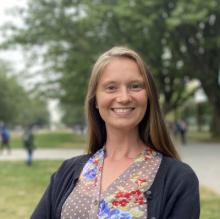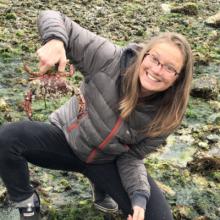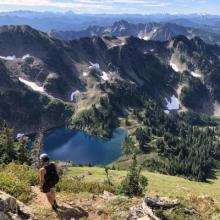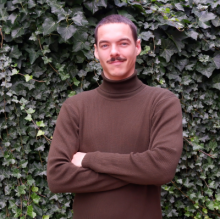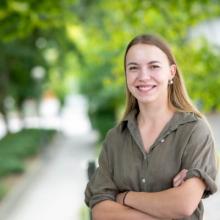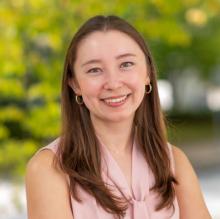To me, Public Scholarship is being part of a community that is committed to expanding and redefining the boundaries of academia so that it is more inclusive of and useful to a broader segment of society. It means using the rigorous tools of academia to take action that makes our world more just and equitable.
Research Description
I am partnering with the Southern Grizzly Bear Stewardship Steering Committee to design and implement an inclusive public consultation process to help understand the opinions, hopes, concerns, and values of diverse communities who live in and around a proposed grizzly bear recovery area. The intent of this work is to understand and support communities that could be affected by grizzly bear recovery efforts and to develop a process that is transferable to other wildlife recovery projects. Large predator recovery can cause cascading ecological, economic, social, and cultural effects. People hold mixed views about recovering top predators where they have long been absent. Appropriate and inclusive “rewilding” of predators and other biodiversity must take into account diverse values and current and historical relationships people have with the land, other species, and communities.
What does being a Public Scholar mean to you?
To me, Public Scholarship is being part of a community that is committed to expanding and redefining the boundaries of academia so that it is more inclusive of and useful to a broader segment of society. It means using the rigorous tools of academia to take action that makes our world more just and equitable.
In what ways do you think the PhD experience can be re-imagined with the Public Scholars Initiative?
PhD students’ jobs are to ask questions that matter and that have never been asked before, so we are well-poised to make important impacts on the world. However, the questions we traditionally ask are selected to fill academic “literature gaps” and results are often published in physically or linguistically inaccessible journal articles and books. Working in academia, I have often found myself wondering, “Am I asking an important question? Is anyone interested or listening? Did I get the story right? Will people use this work?” I think the role of Public Scholarship is to re-imagine the PhD experience so we can emphatically say “Yes!” to all of these questions. I am excited by two particular ways the Public Scholars Initiative is helping to re-imagine the PhD experience to be more impactful. First, encourage sharing decision-making responsibility about which questions “matter” with communities of practice who are poised to use the information. Second, sharing the findings in multimedia and interactive ways that accommodate diverse learning styles and allow for knowledge exchange between researchers and their audiences.
How do you envision connecting your PhD work with broader career possibilities?
After finishing my PhD, I hope to work in or with a land or wildlife management agency or applied research institute to help develop holistic social and ecological approaches to managing land, wildlife, and our relationships with them. I think our education system often teaches us to approach and address extremely complex environmental problems in narrow and siloed ways. My interdisciplinary PhD program has helped me understand the diversity of ways people can approach environmental management, and strategies to integrate these divergent approaches. It has given me a more robust set of tools and methods, and a greater understanding of how the fields of ecology, sociology, psychology, anthropology, ethics, economics, and more understand and address environmental problems. It has also helped me see that often it is not appropriate to only use western academic ways of knowing to define or solve societal problems, and we need to upwardly value and better integrate traditional and experiential ways of knowing into environmental management. I will carry all of these skills forward in my career, whether it is in government, academia, or the private sector.
How does your research engage with the larger community and social partners?
I am doing my research in partnership with the Southern Grizzly Bear Stewardship Steering Committee, which includes government, First Nations, and NGOs. The explicit purpose of our work is to develop and implement a public consultation process that will help to understand and integrate the perspectives of the larger community into land and wildlife management plans.
Why did you decide to pursue a graduate degree?
To be honest, for many years I did not imagine myself pursuing a Ph.D. I worked for four years after completing a BA at Oberlin College in 2009, and again for five years after completing an MS in 2015. The time I spent working for and with NGOs, consultancies, research institutes, and government taught me that solving the complex environmental management problems that we currently face requires an interdisciplinary lens. I also discovered that I am a forever learner who thrives on learning new things and having my worldview challenged. For many years, I felt like I could do my job better if I had a better understanding of the paradigms and theories that underpin our ideas and plans for how to conserve and restore ecosystems, as well as more training and practice with rigorous methods for asking and answering complex questions. So, I eventually decided that pursuing a PhD made sense for me.
Why did you choose to come to British Columbia and study at UBC?
I decided to study at UBC for several professional and personal reasons. The Institute for Resources, Environment, and Sustainability at UBC is a highly interdisciplinary environment with a commitment to applied and problem-oriented research, and it is important to me that my work helps to solve real-world problems. IRES is also a top-ranked program in my field globally, with faculty and graduate students from all over the world who have an unbelievable breadth and depth of skills and interests. I was – and continue to be – incredibly excited to learn from and with my peers. I was also inspired by the work of my supervisor Dr. Kai Chan to identify and enact bold, strategic actions to transform our social and economic systems so they can support more biodiverse futures. Kai has an impressive interdisciplinary background and obvious passion. He is a leader in his field. I was excited to learn from and build upon his lab’s work. Coming to UBC also made sense in my life. Most advice about choosing graduate programs suggests that you should uproot and relocate to find that perfect opportunity. I did that for my M.S. program, and I had a wonderful experience, but that wouldn’t have been the right decision for me at this point in my life. I feel – and want to feel even more – rooted in the Pacific Northwest. When I look at aerial photographs of my home, I see that I live in a complex social-ecological system that is divided by constructed political boundaries, built on unceded or wrongfully taken territories, and includes everything from densely urbanized to remote, wilderness landscapes. I have so much to learn about this place I call home, and I knew that I could make that learning part of my work at UBC. My research emphasizes the important role that relationships play in accomplishing sustainability transformations. Coming to UBC was a commitment to strengthening my relationship to this place, and to the organizations and communities who value this place.

